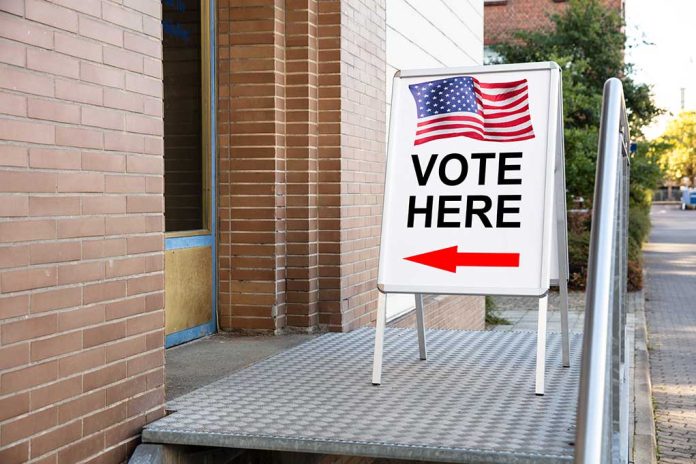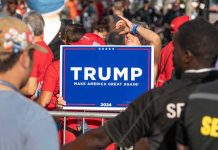
House Democrats mount resistance against a voter ID requirement in a pivotal spending bill.
At a Glance
- House Speaker Mike Johnson withdrew a spending bill requiring voter ID for federal elections.
- Democrats and some Republicans opposed the bill, citing concerns over voter disenfranchisement.
- Former President Donald Trump urged Republicans to support the voter ID provision.
- The bill’s failure could lead to a partial government shutdown before the presidential election.
Democrats Oppose Voter ID Requirement
House Democrats, led by Minority Leader Hakeem Jeffries, oppose the inclusion of a voter ID requirement in a six-month stopgap spending bill. They argue the provision is polarizing and could disrupt government functioning. The Democrats claim that voter ID laws disenfranchise voters, particularly minority and low-income citizens who might have difficulty obtaining proper identification.
Republicans attempt to add voter ID to spending bill
Despite these claims, the necessity for valid identification is ubiquitous in modern life. Many conservatives argue that requiring ID to vote is a common-sense measure to protect the integrity of elections. Most legal citizens already possess identification, which is routinely used in everyday activities such as driving, flying, and opening bank accounts. Therefore, requiring ID to vote should not be an obstacle for law-abiding citizens.
143 House Democrats voted AGAINST prohibiting non-citizens from voting in our nation’s capital city.
198 House Democrats voted AGAINST requiring proof of U.S. citizenship for voter registration.
202 House Democrats voted AGAINST returning a question on U.S. citizenship to the…
— Rep. Andrew Clyde (@Rep_Clyde) September 10, 2024
Spending Bill Withdrawn Amid Controversy
U.S. House Speaker Mike Johnson withdrew the spending bill that included the voter ID provision, facing opposition from both Democratic and some GOP lawmakers. Johnson emphasized the need to address concerns about non-citizens voting in U.S. elections, despite research indicating that instances of non-citizen voting are rare. However, securing the integrity of elections remains a top priority for many lawmakers.
“We’re going to continue to work on this. The whip is going to do the hard work and build consensus. We’re going to work through the weekend on that,” Johnson told reporters. “And I want any member of Congress, in either party, to explain to the American people why we should not ensure that only U.S. citizens are voting in U.S. elections.”
House Republicans included the Safeguard American Voter Eligibility (SAVE) Act in the continuing resolution (CR) to enforce stricter proof-of-citizenship rules for voting. If the bill fails to pass, the U.S. government could shut down non-essential functions before the upcoming election, potentially affecting public services and national security.
Democrats, who reject commonsense voter ID laws, are using federal resources to register voters in liberal areas across the country.
Election security should not be a partisan issue, yet we have no choice but to host hearings to hold them accountable. pic.twitter.com/yANTG7vBnZ
— Congressman Greg Murphy, M.D. (@RepGregMurphy) September 12, 2024
Political Divide and Future Negotiations
Senate Majority Leader Chuck Schumer and other Democrats criticized the bill as a waste of time and called for bipartisan negotiations. Schumer urged Johnson to draft a new stopgap spending bill without the voter ID mandate. Notably, the White House labeled the voting provision a “poison pill,” signifying its intention to veto any bill containing such measures.
“Is it any surprise that the speaker’s purely partisan CR seems to be running into trouble?” Senate Majority Leader Chuck Schumer said. “The answer is very simple. The House should stop wasting time on a CR proposal that cannot become law.”
House Speaker Johnson faces a narrow Republican majority, limiting his leverage in negotiations. Connecticut Rep. Rosa DeLauro called for bipartisan cooperation to draft a feasible funding bill that could secure support from both Democrats and Republicans in the House and Senate. Meanwhile, Maine Sen. Susan Collins suggested a stopgap bill that would last through mid-December, allowing more time for negotiations on voter ID provisions.
Implications for Election Integrity
The battle over voter ID requirements reflects broader concerns about election integrity. Former President Donald Trump and other conservatives maintain that measures like voter ID laws are essential to protect elections from fraud and ensure that only eligible citizens participate. Trump has even encouraged Republicans to consider a government shutdown if such provisions are not included.
“If you have a few thousand illegals participate in the election in the wrong place, you can change the makeup of Congress and you can affect the presidential election,” Johnson said. “The American people understand that.”
Despite these assurances, some Republicans like Senate Majority Leader Mitch McConnell oppose a government shutdown, emphasizing the importance of maintaining government operations. As the November presidential election approaches, the outcome of this legislative battle will significantly impact not just governmental continuity but the sanctity of our democratic process.
Sources:
- Jeffries Says House Democrats Oppose Stopgap Spending Bill With Voter ID Requirement
- Speaker Johnson pushes ahead on funding bill with proof of citizenship mandate despite dim prospects
- U.S. House speaker withdraws spending bill that would require ID to register to vote
- Speaker Johnson pushes ahead on funding bill with proof of citizenship mandate despite dim prospects
- Government could shut down before election as Democrats balk at citizen voting rule in spending bill






